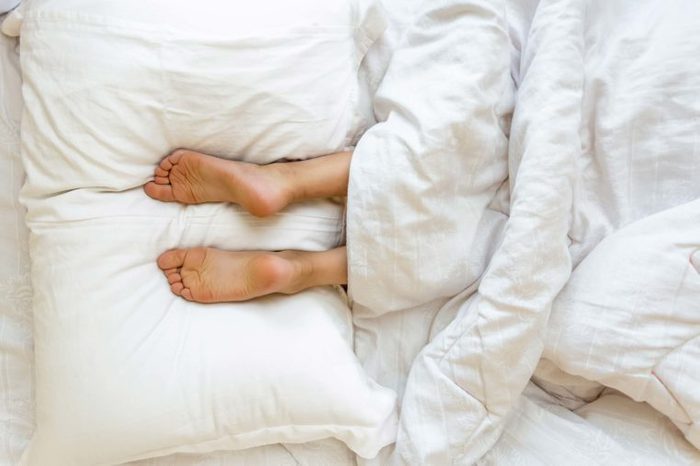
How much sleep do you need?
You feel like you’re always going to bed early, but when your alarm goes off, it’s hard to open your eyes and you’re in a fog all day. You may feel like no matter how much sleep you’re getting, you’re still tired. But how do you know how much sleep you need?
How much sleep you need varies by age. While newborns under three-months-old may need up to 19 hours of sleep and adults over 65 may need as little as five hours, most adults need about seven to nine hours of sleep a night, according to the National Sleep Foundation. While not getting enough sleep can hurt your health in these sneaky ways, oversleeping and constantly being tired can be a sign of a problem.
“Oversleeping means that you are sleeping for more than ten hours on a consistent basis,” says Conor Heneghan, PhD, director of research and algorithms at Fitbit. “Oversleeping has been correlated with certain health conditions, such as depression, but it is not a known cause of any health disorders. While irregularities in the body’s sleep clock may play a role in mood, returning to a consistent sleep cycle is a focus area to get the body back on track.”
If you’re getting enough sleep on a good schedule or are even oversleeping and still feel tired, it could be a sign of health problems.
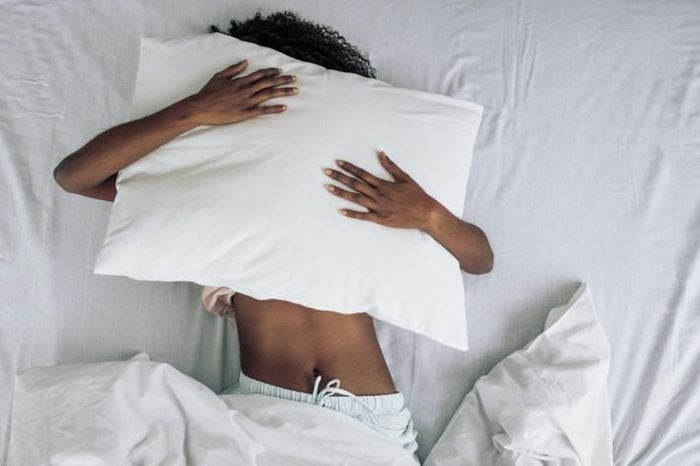
You’re tired because…you’re oversleeping on weekends
You may think skimping on sleep during the week and oversleeping during the weekends will help you feel well rested, but it’s actually hurting your sleep. This habit is called “social jetlag” which is brought on by shifts in sleeping schedule during the week versus on the weekends. “While the recommended average sleep time for adults is seven to nine hours every night, often we may try to catch up on sleep during the weekends,” Heneghan says. “Your body will attempt to recover from the effects of sleep deprivation by having “rebound” sleep − typically associated with longer overall sleep time, increased deep and REM sleep, and reaching the REM sleep state more quickly. However, oversleeping can offset your cycle and has been linked to other health risks.” Here are 13 ways daylight saving time is wrecking havoc on your health.
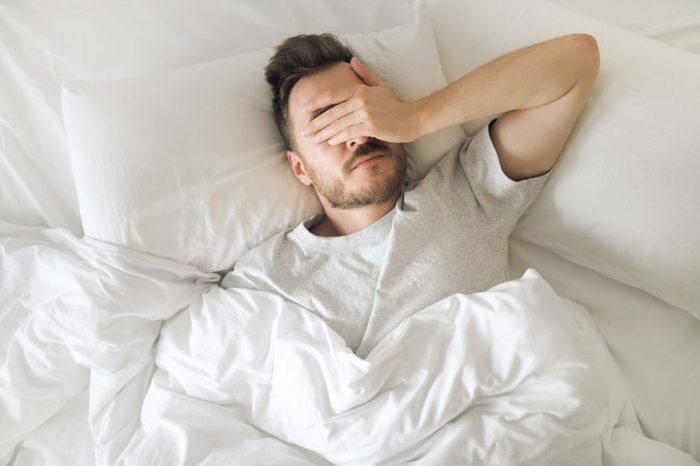
You’re tired because…you have a condition that causes chronic pain
“People who suffer from conditions that result in fatigue and pain often require more sleep in order for their bodies to properly rest and recover,” says Matthew Ross, co-owner and COO of mattress review site, The Slumber Yard. Oftentimes people with fibromyalgia, hypothyroidism, anemia and rheumatoid arthritis may need more sleep and find themselves tired if not getting enough.
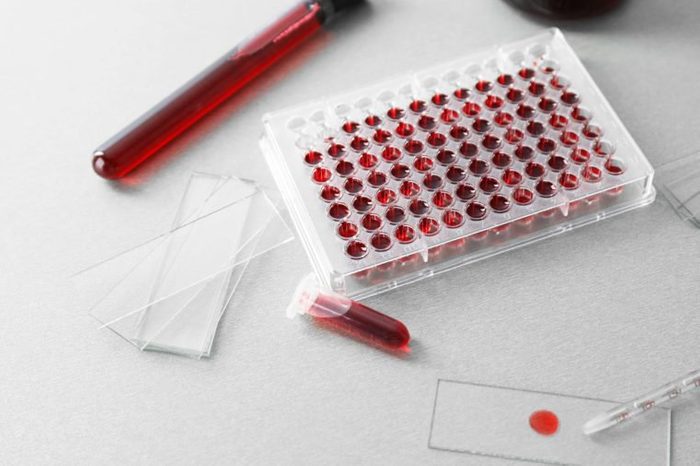
You’re tired because … you’re anemic
When you visit your doctor and complain of feeling tired all the time, the first things they’ll often check for is anemia or thyroid disorder because you can detect those with a blood test, says Amy Shah, MD. “When a patient says ‘I’m tired,’ it’s such a broad term and could be so many things, but if someone says ‘I’m tired and feeling a little more short of breath,’ or, ‘I’m having trouble exercising,’ that tends to be anemia. Anemia is when your blood doesn’t carry enough oxygen to the rest of your body and the most common cause of anemia is iron deficiency. Anemics may also experience feeling cold, dizzy, irritable, or have headaches in addition to feeling tired.

You’re tired because … you have a thyroid problem
If you have a thyroid issue, like an underactive thyroid (hypothyroidism), you probably won’t feel like your best self. In addition to feeling tired, you might also feel like your skin is really dry and you’re constipated a lot, along with the lack of energy, says Dr. Shah. Hypothyroidism is a condition that occurs when your thyroid gland doesn’t produce enough of certain important hormones. While women are more likely to have hypothyroidism, thyroid function tests can diagnose hypothyroidism easily and if you have an issue, your doctor may prescribe a synthetic thyroid hormone.
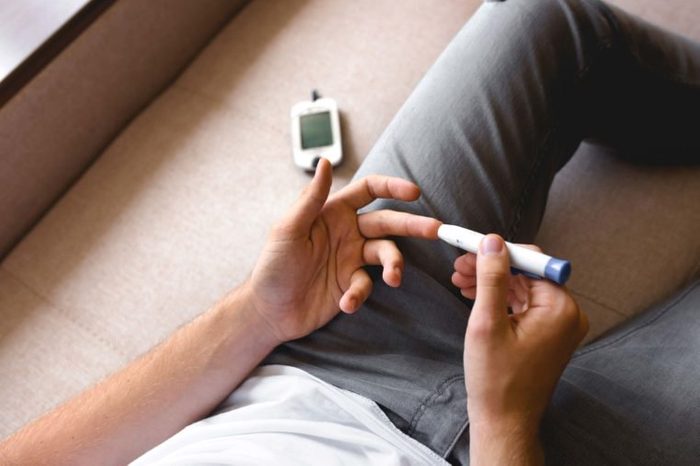
You’re tired because you … may have prediabetes or diabetes
When you have high blood glucose, your blood circulation may be impaired so cells can’t get the oxygen and nutrients they need and you feel tired, according to registered nurse blogger David Spero on diabetesselfmanagement.com. Low blood sugars levels also result in feeling fatigued, because there is not enough fuel for the cells to work well, he says on the blog. If your high glucose is causing blood vessels to get inflamed by sugar, that chronic inflammation can also make you feel fatigued, according to research.

You’re tired because … you’re depressed
If you feel like you’re tired all the time, don’t want to get out of bed in the morning, and/or have trouble sleeping, you could be suffering from depression. You primary care physician should do a depression screening during a regular visit, says Dr. Shah. Your doctor can use a screening tool to determine if you’re experiencing an ongoing depressive disorder, or whether a life stressor or alcohol affects your emotional state. “Depression, alcohol abuse, and fatigue are very tightly knit,” says Dr. Shah. Sometimes people will treat depression with alcohol and then be tired, she says.

You’re tired because … you have a leaky gut or food sensitivity
Your gut is supposed to be a very tight tube of cells where nothing from inside of the gut gets into the outside—like a pathway where the body absorbs what it needs without having things enter the rest of the body, says Dr. Shah. “If you’re eating poorly, especially a lot of processed foods, the gut cells can become a looser, net-like structure instead of a tight structure, and proteins that aren’t supposed to be in our bloodstream leak into our bloodstream, which creates an inflammatory response,” says Dr. Shah. The inflammatory response can manifest as bloating, fatigue, moodiness, headaches, or weight gain.
If you have food sensitivities (to foods like wheat and dairy) you can feel fatigued, get rashes, and experience bloating or brain fog. “There’s no real good test for food sensitivities,” says Dr. Shah. Following an elimination diet of possible food culprits and then slowly introducing them back in may help you identify what you’re sensitive to. If you remove all wheat from your diet and feel great, and then add it back and feel lethargic, that could be a telltale sign of a food sensitivity to wheat, Dr. Shah says.

You’re tired because … you’re suffering from adrenal fatigue
“Adrenal fatigue isn’t a Western medicine term, it’s a functional medicine term, and a lot of Western doctors don’t recognize it as a medical [issue],” says Dr. Shah. There’s a disconnect because it’s hard to show with lab testing, she says. Most likely, it’ll show up on tests as adrenal insufficiency, or an endocrine or hormonal disorder that occurs when the adrenal glands do not produce enough of certain hormones, according to the National Institute of Diabetes and Digestive and Kidney Diseases. These hormone imbalances could be brought on by a stressful situation in your life, like family problems, or it could a constant stress at work, lack of sleep, over-exercising, having a poor diet, or drug or alcohol abuse, says Dr. Shah. Those circumstances can push your stress hormones high and then eventually leave you exhausted and depleted, like a bank account that you’re overdrawing on and not putting money back into. Watch out for these silent signs of sleep apnea.

You’re tired because … you have an infection
Doctors will often check for chronic infection as a cause of fatigue due to such infections as the Epstein-Barr virus (mononucleosis) or Lyme disease. Both of these medical issues can present with extreme fatigue.
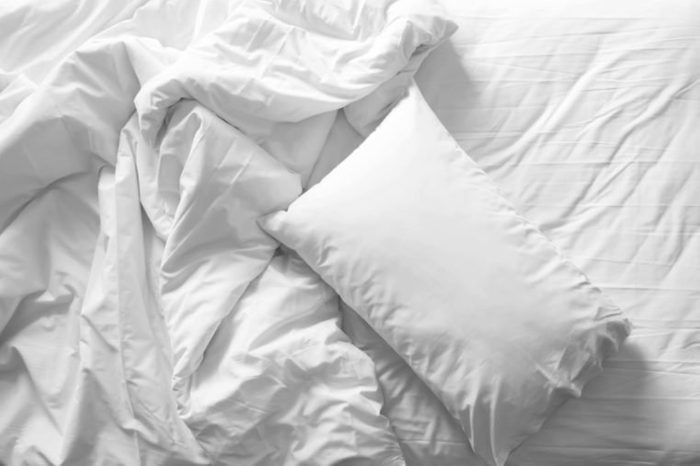
You’re tired because…you have sleep apnea
If you have sleep apnea, your throat starts to close when you’re asleep, which is why people with the condition tend to snore. Not getting enough oxygen sounds scary, but your brain won’t let you suffocate. “The brain notices you’re not getting rid of your CO2, and it wakes up really briefly in an alarmed state,” Lisa Shives, MD, director of the Sleep Medicine Center at the University of California, San Diego School of Medicine, tells WebMD. Good for your breathing, but bad for your tiredness levels. Even though you keep waking up, those wakeful moments are too short for you to notice, so you won’t get why you’re so exhausted the next day.

You’re tired because…you have heart failure
When you have heart failure, your heart can’t keep up with the body’s needs for blood. Your body will start to bring blood away from body tissues so it can keep vital organs fully supplied. With less blood in your leg muscles, even everyday activities can feel exhausting. Plus, blood gets backed up in your veins leading away from your lungs and leaks back into them, making you lose your breath suddenly. When you’re asleep, it could wake you up and make for a restless night. Get a good night’s rest thanks to these snoring remedies.

You’re tired because…you have hypersomnia
Heneghan says oversleeping may be a sign of hypersomnia, a chronic neurological condition where you’re tired no matter how much sleep you get. According to the Hypersomnia Foundation, you may have this condition if you’re tired during the day no matter how much sleep you get at night. The condition usually crops up in adolescence or early adulthood and can seriously affect sleep quality, as well as your ability to function during the day. Here’s how to preserve your sleep hygiene while travelling.

You’re tired because…you have hemochromatosis
Nearly 10 percent of the Caucasian population carries a genetic marker for this condition, which causes the body to store too much iron. In addition to fatigue and weakness, hemochromatosis can also cause joint pain, stomach upset, depression, liver disease, heart trouble, and diabetes, according to hemochromatosis.org, a patient advocacy and information site. While people are born with the condition, symptoms often don’t become obvious until people reach their 50s and 60s. Doctors can test for the condition using various blood screens; if you have any combination of these signs, talk to your primary care physician about being tested. Next, find out the sleep habits that raise your risk of Alzheimer’s disease.
